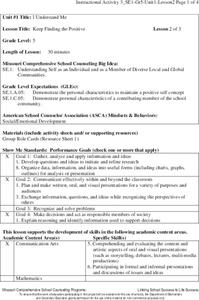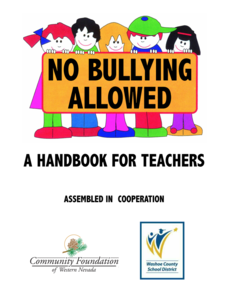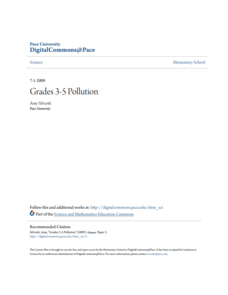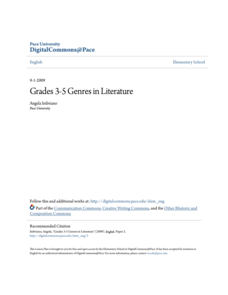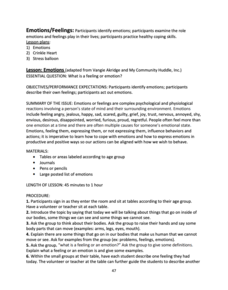PBS
Bird is the Word
Tracking area birds can tell a lot about an ecosystem. Learners use that understanding as motivation to observe and record bird populations in their area. They use journaling to store their information and ultimately choose one bird as...
PBS
All Tangled Up
It is a tangled web the ecosystem weaves. Learners begin an activity on ecosystem interactions by building a food chain and then a food web with yarn as a group. To finish, they research local environmental changes that may impact the...
PBS
Super Sleuths
There's no such thing as the perfect crime! Your class of sleuths are ready to investigate the trace evidence at a crime scene and compare it to a list of suspects. They use their investigative skills to record physical properties of the...
PBS
Print Hints
It would be a crime not to give the lesson a chance! An inquiry-based lesson has pupils assume the role of crime scene investigators as they make observations about shoe prints. They look for patterns in the prints such as distance and...
PBS
No Slip Grip
The force will be with you during an inquiry-based lesson focused on friction. Young scientists explore the effect of different surfaces on friction. They use rubber bands to measure the amount of force needed to move an object on the...
PBS
Insulation Station
It's all about the material. Learners experiment with different substances as they try to keep an ice cube from melting. They draw conclusions by answering a set of questions about the types and amount of material that had the best result.
PBS
Season Seeking
It's a time of change. A hands-on activity engages young scientists in a lesson highlighting the change of seasons. They brainstorm indicators of season changes in nature and then look for them. Next, they record observations in a field...
PBS
Cloud Clues
It's cloudy with a good chance of learning! An inquiry-based lesson begins with an exploration of transparent, translucent, and opaque materials. Young scientists then connect their learning to the different cloud types as they take the...
EngageNY
Reading for Fluency: Readers Theater about the Rainforest (Page 33)
Lights, camera, action. Scholars use page 33 of The Most Beautiful
Roof in the World to create a readers theater. They work in triads and use sticky notes to mark and create their own speaking parts from sections of the text. They...
Smithsonian Institution
Singing for Justice: Following the Musical Journey of “This Little Light of Mine”
Scholars go on a musical journey to discover the origin, importance, and evolution of the song, "This Little Light of Mine". Class members boost their voice talents and clap to the beat while learning the lyrics in both English and Zulu....
Missouri Department of Elementary
Finding the Positive
To instill the importance of a positive classroom community small groups create a collage out of magazine clippings that highlight three characteristics of self-awareness. Written examples accompany the finished product. Groups turn in...
Missouri Department of Elementary
Keep Finding the Positive
Group members take on roles to create a positive classroom community. Learners perform their role—leader, recorder, presenter, timekeeper, encourager, and collector—in preparation for a formal presentation of their positive thinking...
Missouri Department of Elementary
Are You Balanced?
Balance scales create a strong visual of how an individual prioritizes one's self alongside their commitments to the community, school, and home. Scholars complete a graphic organizer then discuss their findings with their peers. A...
Purdue University
What a Waste of Food!
Follow the life of an apple from harvest to the consumer. A three-part lesson describes the different steps to get an apple from the farmer to your kitchen and the approximate waste that happens at each step. They discuss the process and...
Agriculture in the Classroom
Roll of the Genes
Animal reproduction in sheep and cattle is explored with the help of Punnet squares. Scholars employ tools using probability to conclude the color of wool a sheep's offspring will have. Acting as animal geneticists, pupils then take...
Community Foundation of Western Nevada
No Bullying Allowed
Through discussion, role play, read-alouds, writing, and more, scholars explore the concept of bullying and practice having courage while responsibly reporting unfriendly behavior. Friendship and respect are practiced and...
Pace University
Pollution
Over the course of 10 days, scholars take a pre-assessment to place them in one of three leveled groups. Whole-class and in small groups, pupils take part in read-alouds, field trips, hands-on activities, and complete learning contracts...
Pace University
The Iroquois
During the early 1500s, parts of modern-day New York were inhabited by Eastern Woodland Native Americans. To learn about the daily life, value, and traditions of these tribes, fourth graders research the Iroquois. Groups select...
Pace University
Genres in Literature
Enthusiastic readers take part in a book club unit that focuses on genre, particularly historical fiction, fantasy, and adventure. Over the course of 10 days, groups read a variety of stories and choose leveled activities from a learning...
University of Kansas
Feelings - Thematic Unit
Boost language skills with a unit all about feelings. Scholars from all grade levels take part in several lessons that incorporate specific vocabulary terms and adjectives while discussing their feelings with their peers. Reading...
San Diego County District Attorney
Emotions/Feelings
Three lessons delve deep into the topic of feelings and the importance of expressing one's emotions. Through grand conversation, hands-on learning experiences, and reflective writing, scholars interpret the ups and downs of everyday...
Southern Poverty Law Center
Analyzing Gender Stereotypes in Media
Why might toy advertisers use gender stereotypes to sell their products? Young people think critically about media messages and its role in gender stereotyping with a thought-provoking lesson.
Goethe-Institut
Well-Known Tale: The Pied Piper of Hamelin
"The Pied Piper of Hamelin" is the focus of a lesson designed to shed light on the importance of keeping promises. As a class, scholars take part in a discussion on the topic of honesty and consequences. Independent readers then take to...
Poetry4kids
How to Host an Open Mic Poetry Party
Four steps to Open Mic Night! The location, invitations, supplies, and party favors are all part of the process in planning and hosting a fun-filled gathering where scholars read aloud an original poem or one by their favorite author.













